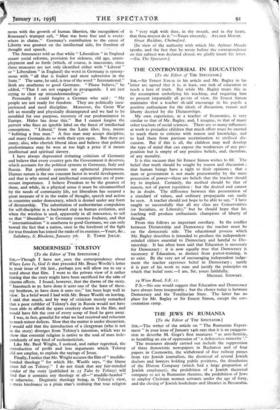MODERNISED TOLSTOY
[To the Editor of THE SPECTATOR.]
Sra,—Though I have not _seen the correspondence about Where Love Is, God Is that preceded Mr. Bruce Woolfe's letter in your issue of 7th inst., perhaps you will allow me to say, a word about that film. I went to the private view of it rather fe.ating that the story might have been sacrificed for the sake of cinema effects. I found, however, that the theme of the story, " Inasmuch as ye have done it unto one of the least of these, my brethren, ye have done it unto me," has been kept well in view. 'in a brief word I had with Mr. Bruce Woolfe on leaving, I said that much; and by way of criticism merely remarked that a poor cobbler of Tolstoy's day in Russia would not have been able to afford the spare crockery shown in the film, and would have felt the cost of every scrap of food he gave away.
I was, in fact, grateful for what we had received and reluctant to mark minor defects. Now that the matter is under discussion, I would add that the introduction of a clergyman (who is not in the story) diverges from Tolstoy's intention, which was to show that essential religion is native to the soul of man inde- pendently of any kind of ecclesiasticism.
Like Mr. Basil Wright, I noticed, and rather regretted, the introduction of profit and loss arguments which Tolstoy did not employ, to explain the sayings of Jesus.
/ notice that Mr. Wright accuses the film of " muddle- headed theology " for which Mr. Woolfe says, " the blame must fall on Tolstoy." I do not think that any fair-minded reader of the story (published in 23 Tales by Tolstoy) will find that it contains any theology at all—" muddle-headed " or otherwise. Dogmatic theology being, in Tolstoy's a main hindrance to a plain Man's realising that true religion
[In 'view of the authority with which Mr. Aylmer Maude speaks, and the fact that he wrote before the correspondence on this subject was declared closed, we gladly insert his letter. —En. The Spectator.] -














































 Previous page
Previous page